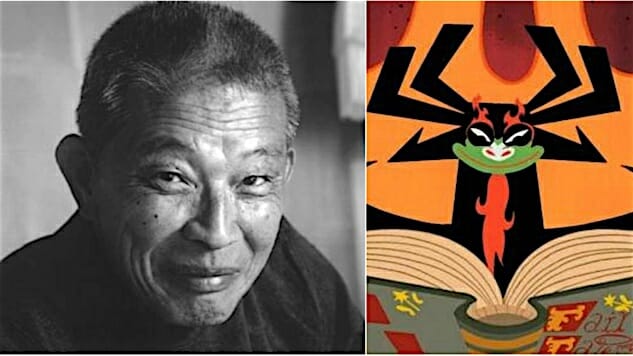Remembering Mako
As Samurai Jack returns, the trailblazing actor who voiced his ultimate foe will be sorely missed.

Once again I am free to smite the world as I did in days long past.
—Aku, the Master of Masters, the Deliverer of Darkness, the Shogun of Sorrow, etc.
“He was one of the early truly trained actors who was able to take stock roles, roles seen many times before, and make an individual a live and vibrant character.”
—George Takei, in Mako’s obituary in The New York Times, 2006
There’s no contest: Samurai Jack is the ultimate hero. He’s born of noble blood. He’s got an indestructible magic katana that was forged by the gods from his own father’s soul and whose blade harms only the unrighteous. He’s been trained from boyhood in every deadly art by the baddest fighters of every Old World culture from Shaolin monks and Mongolian cavalrymen to the ancient Romans and Robin Hood (somehow). And yet, it’s not any of these things that make him truly great. Rather, it’s the evil he faces.
Aku is a towering, form-fluid personification of pure sadism, ego and greed. Introduced as an evil shapeshifting wizard, the show eventually retconned him to be an errant fragment of some unknowable malice from the very dawn of creation. He conquers the entire world and reduces it to a polluted, lawless post-apocalypse. He belongs in the same pantheon of baddies as timeless foes like the Joker or Voldemort.
And there’s a very good reason his booming, gravelly voice provides the show’s opening exposition, or that his thundering taunts often outnumber the hero’s lines in a given episode: That voice was Mako’s.
As a generation of hyped up fans eagerly await the return of Samurai Jack in just a few days, I’m sure I’m not the only enthusiast who feels anew the loss of Mako Iwamatsu (1933-2006), whose physical stature was as slight as his voice was mighty. Since you—the person reading this article right now—are no doubt well into a back-to-front binge watch of all four seasons of Jack on Hulu, it’s a good time to look back at a trailblazing actor who could play the most humble, the most wise, the most bumbling, and the most evil with such inimitable charm that he needed only one name.
A Man of the East and the West
Born in Kobe, Japan, in 1933 to parents who wrote and illustrated children’s books, Iwamatsu Makoto experienced the Second World War as a boy under his grandmother’s care. His parents left to study art in the United States, avoiding internment because they lived on the East Coast. It was only after the war that he rejoined them there and eventually became a naturalized U.S. citizen. The young immigrant settled in California and, after an abortive attempt at learning architecture, became fascinated by the stage. So much so that he dropped out of school, he said, screwing up his draft deferment in the process. A two-year stint in the military gave him opportunities to travel throughout Asia and reconnect with his heritage.
Fellow Japanese-American actor George Takei remarked that Mako faced struggles in his career because he was an immigrant.
“There was the linguistic challenge,” Takei said. “But he recognized we needed more opportunities to practice our craft.”
The Godfather of Asian-American Theater
Determined nonetheless, Mako pursued a stage career and founded The East West Players in 1965. The stage company was aimed at nurturing Asian actors.
“We started talking about … [how] most of us were caught being stereotyped in television and movies whenever a bunch of us would work together, and that went on for several years,” Mako said in a 2000 interview. “Finally, in 1965, we said: ‘We gotta do something … we gotta do things of our choice. We can’t wait for someone to say, hey, you guys gotta do something-we can’t wait for that.’ So, that’s how we started East-West Players.”
-

-

-

-

-

-

-

-

-

-

-

-

-

-

-

-

-

-

-

-

-

-

-

-

-

-

-

-

-

-

-

-

-

-

-

-

-

-

-

-








































